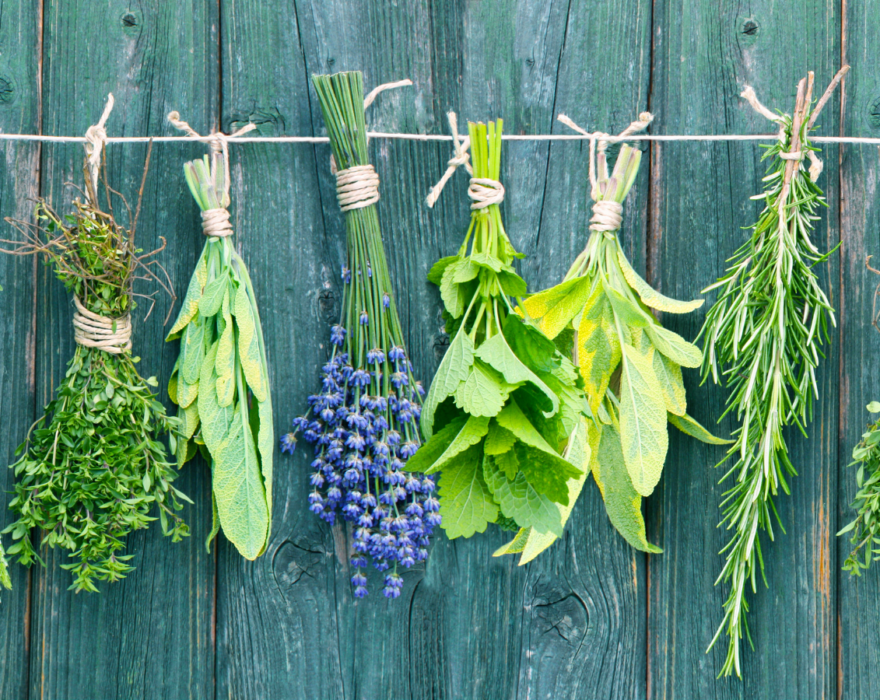In the month of January, it seems everyone is focused on beginning the new year with a fresher, healthier lifestyle. Whether it be exercising, consuming a healthier diet, or protecting themselves from colds and flus, people are looking for ways to get fit and stay healthy during the winter months.
In terms of eating better, a simple way to introduce more nutrients and antioxidants into your diet is by preparing meals with fresh organic herbs. Now, if you’re not one who knows your way around a kitchen you may think of herbs as a fancy garnish that comes atop your food at a restaurant. I’m here to tell you there is a long list of organic herbs with health benefits that can be easily used in recipes for everything from a smoothie to a pot roast.
Why Organic?
Organic herbs are always my first choice for cooking. Grown without toxic chemicals and free from preservatives or fillers, organic herbs are the healthiest choice for all of your meals and herbal remedies.
Freeman Organic Herbs are fresher, more flavourful and more nutrient-dense than those grown with pesticides. Due to their natural and preservative-free nature, your body will receive more nutritional benefits from organic herbs, because they are free from harmful agricultural chemicals. Organic herbs are especially in demand for treating diseases and health issues because they lack any harmful elements.
Nutritional Value and Uses for Organic Herbs:
Whether your goal is to start eating cleaner or take a holistic approach to your diet, adding Freeman Organic Herbs to your meals is a great way to help fight off diseases and contribute to a healthier lifestyle. Below is a list of herbs and the nutritional benefits and uses associated with them.
- Basil: Basil contains high levels of magnesium, and vitamin K, which contributes to bone health, energy production, and the regulation of blood pressure. It is a popular herb used in Italian dishes such as soups, pesto, and pizza.
- Chives: Chives are high in beneficial nutrients, including vitamins, minerals and antioxidants. Chives can help prevent cancer, and osteoporosis and improve memory. People tend to use chives as a garnish or topping for main meals or salads, though they can also substitute chives for onions in other recipes.
- Cilantro (Coriander): Cilantro is rich in phytonutrients, which regulates hormones, strengthens the immune system and reduces inflammation. It’s popular in Mexican dishes, like tacos, chili, and salsa.
- Dill: Dill is high in calcium and vitamin C. It also contains phytonutrients that have been shown to reduce the risk of cancer, heart disease, stroke, Alzheimer’s, and Parkinson’s disease. Dill is often well paired with salmon, potatoes, and yogurt-based sauces.
- Mint: Mint contains fibre, vitamin A, iron and folate. Known to help calm digestive troubles, relieve nausea, and refresh the breath. Mint is also known to help alleviate allergy symptoms such as congestion and respiratory discomfort as well as helping to relieve nausea and headaches. Mint can be added to dips, juices, tea, lamb, and prawns.
- Oregano: Oregano is known for its anti-viral, anti-bacterial, and antibiotic properties, oregano has been used in herbal medicine as far back as ancient Greece. Today, its purported medicinal uses include the treatment of respiratory tract disorders, gastrointestinal disorders, menstrual cramps, and urinary tract disorders. Oregano is often used to season marinades, stuffing, bread, salads, and meat.
- Parsley: Parsley contains significant amounts of vitamins A, C, and K. Studies show it may help regulate digestion and reduce bloating. Parsley is used in a variety of recipes for chimichurri, tabbouleh, quiche, pasta, chicken and fish.
- Rosemary: Rosemary is known to contain a high concentration of the antioxidant carnosol, which research shows may have benefits in cancer treatment and healthy digestion. Rosemary is a traditional herb used in Mediterranean cuisine. Sprinkle sprigs of rosemary over meat, pasta and vegetables while cooking or enjoy it in tea and other beverages.
- Sage: Sage is very high in vitamin K, and it also contains vital minerals like magnesium, zinc, and copper. Sage can be used for a sore throat, memory loss, diabetes and high cholesterol. It’s found in a number of delicious recipes from schnitzel and pot pies to potatoes and pasta.
- Thyme
Thyme contains thymol, a potent antioxidant, which has been shown to destroy harmful organisms, such as infectious bacteria. It has shown promise in cancer prevention and treatment, as well as yeast infections, high blood pressure, and common skin problems. Thyme is most commonly used to season meat, vegetables and soups.
Where to Find Freeman Organic Herbs
If you’re looking to start off the new year as a stronger, healthier you, head to your local grocery store to pick up some potted organic herbs.
Freeman Herbs grows 12 organic herbs year-round that can be found in independent grocery stores and chains throughout Ontario.
Freeman is the largest fresh herb grower in Canada and is listed as one of the top five in North America.
Unlike other distributors that offer cut herbs, Freeman grows organic, potted plants that continue to produce weeks after you bring them home. The plants are grown in sustainable pots that fit on your countertop or windowsill. It’s the absolute freshest and tastiest option available this time of year, when outdoor gardens are nonexistent.
For inspiration on how to incorporate organic herbs into your lifestyle and diet, visit www.freemanherbs.com for recipes.
